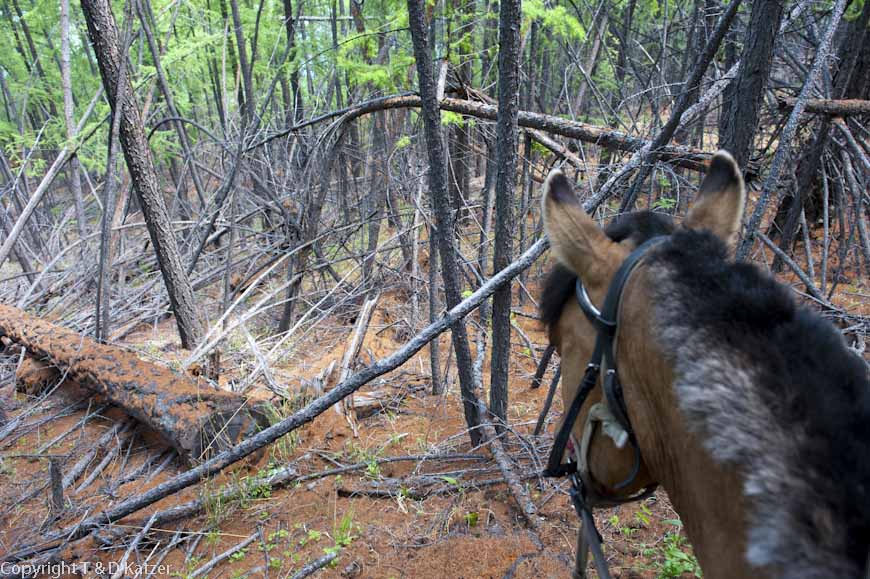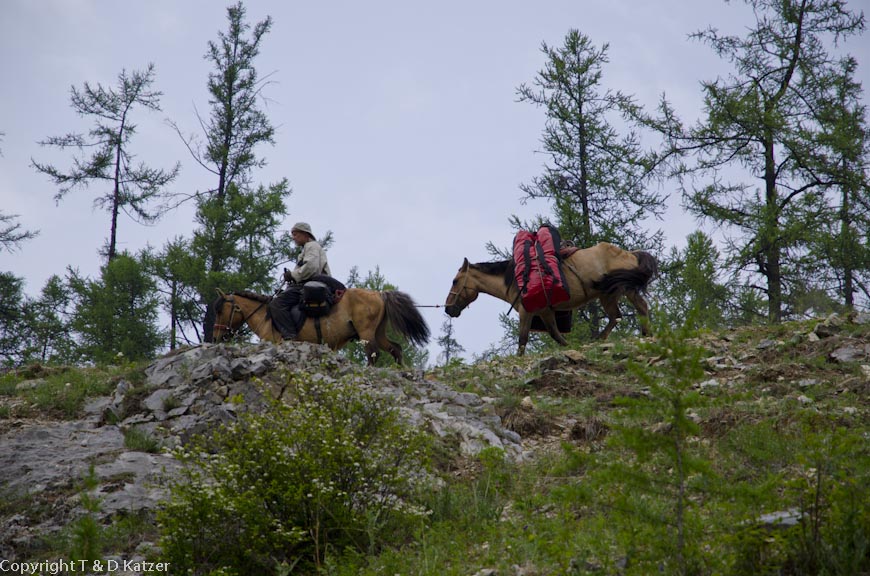
At the end of Lake Khuvsgul
N 50°30'439'' E 100°09'613''
Day: 342
Sunrise:
05:11
Sunset:
21:34
As the crow flies:
6,02
Daily kilometers:
10
Total kilometers:
1603
Soil condition:
Grass, roots, scree
Temperature – Day (maximum):
24°C
Temperature – day (minimum):
18°C
Temperature – Night:
8°C
Latitude:
50°30’439”
Longitude:
100°09’613”
Maximum height:
1790 m above sea level
Time of departure:
11:30
Arrival time:
14:30



After another peaceful night without any thieves or other unpleasant visitors, we pack up in high spirits and leave this beautifully situated forest camp. The luggage fits perfectly to my satisfaction. Important on this narrow path. Tanja Shraga and I lead Tenger so that the overhanging equipment of the packhorses doesn’t constantly thunder and scrape against trees. We let Bor run free with his smaller and lighter courier bags.
The dense coniferous canopy of the larch trees only allows sunlight to reach the forest floor in places. We ride with concentration over the ground, which is overgrown with roots and strewn with rough stones. The path leads us steeply uphill only to drop just as steeply into a valley again shortly afterwards. Fallen trees lie across the path. The horses climb over it with care. Despite all the attention, the duffel bags scrape against the one or other giant tree. Fortunately, Tenger is not startled but remains relatively calm. In some sections, the mule track leads us close to the cliff edge that drops steeply down to the lake. We consciously steer our horses away from it as far as possible. Only the free-running Tuya, Mogi and Bor trot dangerously close to the abyss. If just a few centimeters of the scree crumbled away, the three would plunge into the depths. We hold our breath more than once, but fortunately it goes well. Even for experienced riders, this route is dangerous and unpredictable in some places. It demands our full experience potential and despite this, or perhaps because of this, today’s ride gives us great pleasure. Pure adventure and without any exaggeration. Sometimes the embrace of the jungle spits us out onto a treeless, lush pasture. The view from up here of Khusgul Nuur, which lies deep below us, is overwhelming. The surface of the water glistening in the sun merges with the haze and the clouds. The mountain ranges surrounding the lake are only vaguely recognizable. “There’s Khatgal!” I shout to Tanja, pointing south. She has also reined in her mare to enjoy the sight. Even if the village cannot be seen from here because it is hidden behind a mountain flank about 15 kilometers away, we know its position.
We lead our mounts along a stony path that slopes precariously downwards. To avoid falling out of the saddle over the horse’s head, we are forced to shift our entire body weight backwards. The hooves slide over the scree and the heavy duffel bags into the horses’ necks. “Stop!” I yell, startled. We stop immediately, jump out of the saddle, put shackles on our mounts and jump to Sharga and Tenger. With great effort, we are able to slide the load back onto the horses’ backs at the last moment. “That just went well,” Tanja moans.
Three hours after setting off in the morning and 10 kilometers further on, the rustic forest releases us. We are back in the clearing where we reached Lake Khuvgul with Bilgee on October 26, 2011, eight months and five days ago.
As we didn’t see a single person on the forest route and this place is the last grazing area by the lake before the next yurt camps, we decide to leave it at that for today. Tanja points to the small hut at the other end of the meadow and says, “Can you still remember the couple who had that terrible fight?” “Sure, they threw stones at each other and almost killed each other,” I reply. “Looks like the hut is still inhabited,” Tanja concludes as smoke rises into the sky from the hut’s thin stovepipe. “Hopefully the two squabblers have calmed down by now,” I joke. “They had enough time,” Tanja replies with a grin.
In the afternoon, loud music booms across the lake. Astonished, I go to the shore to locate where this noise is coming from. It is the Sukhbaatar. The steamship was put into service in 1911 and maintained the trade connection between Khatgal and the town of Khank on the northern shore, not far from the Russian border. During the Soviet era, this now aged, 41 m long, 8.5 m wide and 11 m high steamer chugged back and forth on the lake between the months of June and September. It was able to carry a load of up to 1,800 tons. Today, only tourists enjoy themselves on it. Their roars and laughter, accompanied by loudspeaker announcements and music, are carried across the lake by a light wind. “This is civilization,” I say to Mogi, who is sitting next to me and also staring spellbound at the iron, floating box with its precarious side. Of course it is normal for people to have fun. When they want to escape the stress of their work or the noise and dirt of a big city. It is good if they drink, eat, listen to music, play or lie naked in the sun. No problem. But how are we ever supposed to get used to it again after living in Mongolian solitude for 15 months? Just the thought of the fast-paced world of bits and bytes in Europe, computers, deadlines and crazy consumption makes my hair stand on end at this moment. Well, if Saraa manages to extend our work permit and thus our visa for another three months, we’re not there yet. Apart from that, Tanja and I were able to reintegrate after living in Australia for over four years, three of which were spent in the deserts. “We’ll make it all right. Come on, let’s go to Tanja,” I say a little wistfully to my dog and leave the shore, accompanied by this collection of unpleasant noises.
A strong thunderstorm is approaching. Its menacing, gigantic cloud towers hover over the lake like ghosts, driving the Sukhbaatar and us into the tent. The downpour is not long in coming. The cold water, which falls from the sky as if a giant had slashed it with his sword, floods the pasture. The spell only lasts for a short time and then the heavens close a little and the downpour turns into a steady downpour. Because we don’t know whether horse thieves will be deterred by the rain, we are forced to remain vigilant during the night. I use our walking poles as additional tent poles and place them on the left and right under the tent entrance, which is folded outwards. I quickly brace the canopy I have created in this way with cords and pegs. “Great, now I can lie in the awning and look after the horses even when it’s raining,” says Tanja enthusiastically.
From this day on, our guard shifts change for the better. In a semi-circle, we hitch up the horses in front of our tent. Mogi stands guard at the entrance and has a view of the horses and the entire camp. If he barks or growls, Tanja or I only need to lift our heads. We can then quickly illuminate the area in front of us with the strong light of the headlamp. If thieves really approach or are already tampering with the horses, they will feel our stones, the pepper gas, the tracer ammunition, the teeth of our dog or the sticks.
“Woof! Woof! Woof!”, barks Mogi and suddenly races into the forest behind the tent. “What’s going on?” I ask, startled. Tanja shines her headlamp into the tangle of tree trunks. “Wild boars,” I say, pointing at the scurrying, squat bodies. “I hope they don’t destroy Mogi,” says Tanja, as wild boars, especially if they have children, are soon invincible, dangerous opponents for any dog. “He won’t drive them into a corner. But it’s better we chain him up again when he comes back from his hunting trip. Apart from that, he has to do his job as a guard dog and not hunt pigs,” I reply. Just 10 minutes later he is standing in front of the tent, panting heavily. “You were unsuccessful. That’s good,” I say, patting him gently and hooking the chain into the carabiner on his collar. Every five to ten minutes until 3:00 a.m., Mogi barks at wild boar and deer that are looking for food on the lush green area by the lake.
We look forward to your comments!

